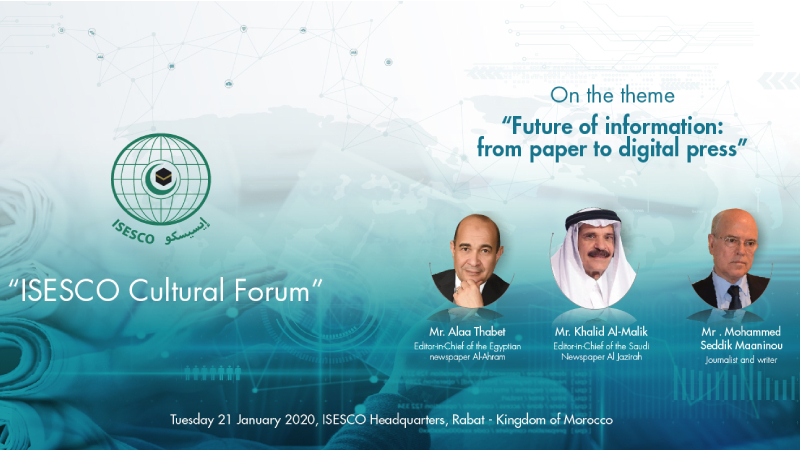
ISESCO Cultural Forum discusses the future of information from paper to digital press

9 January 2020
Is traditional media dead, and how can paper press survive in the digital era? This question will be tackled at the 3rd gathering of ISESCO Cultural Forum, which was launched by the General Directorate of the Islamic Educational, Scientific and Cultural Organization (ISESCO), and hosts intellectuals from inside and outside the Islamic world to discuss major intellectual and cultural issues. ISESCO published a series of booklets on the previous gatherings. The 3rd gathering, due to be held on 21 January 2020 at 18:00, at ISESCO headquarters in Rabat, will discuss the theme “Future of Information: From paper to digital press”.
The forum hosts three renowned media figures in the Arab world, namely Mr. Khalid Al-Malik, Editor-in-Chief of the Saudi Newspaper Al Jazirah, Chairman of the Board of Directors of the Saudi Journalists Association, and President of the Gulf Press Union; Mr. Alaa Thabet, journalist and Editor-in-Chief of the Egyptian newspaper Al-Ahram; and Mr. Mohammed Seddik Maaninou, renowned Moroccan writer and journalist, who served in many positions, including former director of the National Television, and former general secretary of the Ministry of Communication.
The gathering will discuss the various aspects of this issue, including the environmental dimensions as journalism has been related, since its emergence, to paper and still maintains this relationship in spite of the competition with the radio and television. However, deforestation and the exacerbation of environmental problems as well as the transformations induced by the digital revolution have immensely reshaped the relationship of press with paper, changed media practice, and influenced the development of journalism.
Among the salient manifestations of this development is the renewal of media practice, the reorganization of the editorial boards in media institutions, the development of the new media activities and professions, and the new competencies required in this field. Besides, the areas of press have expanded to cover new sectors. New types of press also appeared as part of the opportunities offered by the technological development.
The emergence of social media networks such as Twitter and Facebook had a clear impact on press and information. These networks have become among the working mechanisms of journalists taking into account their impacts likely to threaten the profession’s ethics.
It is worth mentioning that the first and second gatherings of ISESCO Cultural Forum had a great media coverage both inside the Seat Country and abroad. They were attended by a large and diverse audience, including intellectuals, politicians, media professionals, civil society organizations, professors, researchers and students. The invitation is open to anyone interested to attend.




